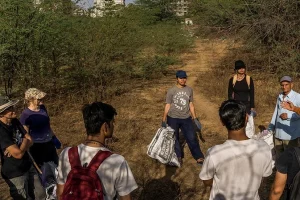The main goal of sustainability is to protect the planet so that future generations don’t have to suffer. Ultimately, we only have finite resources on this planet, but we’re currently not being considerate of that.
Our actions now shouldn’t be at the expense of our fellow creatures or humans, so it’s important to be aware of sustainability in our daily lives so we don’t cause more irreparable damage to Earth.
There are so many different ways to be sustainable. One example is green energy – wind power, for example, is a free, natural, and infinite resource that doesn’t cause harm to others, but does help to keep society functioning.
Another good example is creating, maintaining and looking after green spaces. This is because green spaces and plants improve air quality, protect water quality and reduce soil erosion, to name a few benefits.
Sustainability should be taught to young children so that they embed healthy practices into their everyday lives without even thinking about it. For example, teaching them about composting, recycling, caring about animals and plants, and shopping second hand from a young age.
In later life, there are so many great resources, videos and sustainability courses that can teach people how to live more sustainably.
The benefits of sustainability are countless, but to simplify this answer, we’ll break it down into thinking about the three pillars of sustainability. Sustainable practice benefits the environment by conserving and looking after Earth’s resources, preventing global warming and extreme weather, and protecting lives.
It benefits the economy by reducing wasted time, effort and power and finding a balance between growth and responsibility. It benefits society by building up communities and supporting those who are most vulnerable.
It’s not always easy trying to make sustainable choices in a society where overconsumption and endless consumerism is encouraged, not only by the world’s biggest corporations, but also by some governments.
However, more companies and governments are paying attention to sustainability than ever before, making it easier to make more informed and ethical choices. It may require a bit more research, but the benefits are endless.









Lets Unite to save the environment. The environment is the greatest luxury, pledge to save the environment.
© 2025 GatheringGreen.org